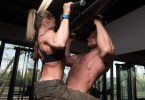Why Don’t Gyms Allow Deadlifts
The deadlift is one of the best, if not the best, exercises for building strength and muscle mass. In terms of muscle groups worked, few exercises can match the deadlift’s ability to recruit the entire posterior chain (hamstrings, glutes, lower and mid-upper back, traps) as well as secondary and supplemental muscle groups.
You’d think that the deadlift would be the first exercise on many people’s workout plans because of its reputation.
This exercise has been largely ignored due to concerns about injury, but it’s also true that some people can’t do it because their gym does not allow them to. The decision to ban such a great exercise from gyms is surprising.
Why aren’t deadlifts allowed in gyms? Some gyms prohibit deadlifts for a variety of reasons, including to protect the gym’s equipment and flooring from being damaged.
To avoid encouraging a “hardcore” weightlifting atmosphere, they also work to minimize the noise generated by dropped weights and other equipment.
Joining a gym and paying for a membership only to discover that you are unable to perform one of the most beneficial exercises is a frustrating experience. Since gyms ban deadlifts, we’re going to look into why and if you can do anything about it (which is basically join a better gym or build your own at home).
For what reason are deadlifts banned from gyms?
Deadlifting is banned in some gyms for a variety of reasons. A universal solution does not exist, either. Deadlifts are prohibited in some gyms due to safety or insurance concerns.
In some cases, this is because their trainers are unfamiliar with how to perform the exercises. Here, we’ll go over all of the possible reasons why.
Of course, it’s important to remember that not all gyms have banned deadlifts. In any case, it’s a fairly widespread trend that many gyms have adopted. Why do you think this is? Gyms don’t allow deadlifts for four main reasons.
- Reasons of Legal and Insurance
Dead lifters are well aware that heavy weights can fall to the ground when they’re lifted in this way. Obviously, slamming a few hundred pounds into the floor is going to cause a lot of damage. Deadlifts may be prohibited in some gyms to prevent injury or damage that the gym’s insurance may not cover.
In addition, deadlifts are a dangerous and complicated exercise. One has to know how to properly deadlift to avoid injuring themselves, and your average gym-goer does not.
People will, of course, continue to try things they don’t know how to do, which could result in injury and the possibility of a lawsuit. Of course, gyms do not desire this.
-
Lack of Knowledge
Deadlifts, as previously stated, necessitate knowledge of how to perform them correctly. However, because of the proliferation of exercise machines, many trainers lack the experience necessary to demonstrate proper deadlifting technique. Because of this, they don’t teach it.
The risk of legal action is high if they attempted to teach it and caused harm to someone due to poor technique.
-
Weights and Measures: An Expensive Option
Some gyms ban deadlifts because they don’t have enough weights for people to lift. Larger, heaver weights are more expensive for the gym to purchase, so they are rarely available. Some gyms may not purchase the heavier weights needed for deadlifts in an effort to save money.
-
Meeting the Needs of the Many
Commercial chain gyms are the only ones affected by this reason. If we’re being honest, most people who frequent these gyms aren’t there to lose weight or get in shape on a regular basis. As a rule, the majority of people who use these facilities are inactive members.
Deadlifting is a strenuous exercise that should not be taken lightly. This is a challenging exercise that should only be attempted by dedicated gym goers who take their training seriously. Because of this, it’s likely to scare away regular gym-goers who may feel judged or inadequate, making it less likely that they’ll join.
No one likes to feel judged or stupid, and many people who go to the gym aren’t all that fit, which may seem absurd. People who go to gyms that have serious and complex workouts are more likely to be regulars, making it seem like a “serious gym” to those who aren’t.
Uncomfortable gym goers are less likely to return and are less likely to pay for a membership in a facility with that kind of atmosphere. In contrast, gym-goers who feel at ease in their surroundings are more likely to keep their memberships, believing that they might return.
Because these commercial chain gyms are owned by corporations, profit is their primary concern. It’s unfortunate. If you have a lot of members who don’t actually use the gym, then you’re better off catering to those people rather than those who are interested in deadlifts.
Are Deadlifts now banned at Planet Fitness?
Yes, that’s what I’m getting at. There has been a ban on deadlifts at Planet Fitness for a long time now. While Planet Fitness has a policy of not allowing deadlifts, some gyms may still allow them and just look the other way. At the very least, a few of our members have related such tales.
Officially, Planet Fitness does not allow deadlifts, so if that’s what you’re looking for in a gym, you’ll have to go somewhere else.
The ban on the deadlift was put in place by Planet Fitness (and other commercial gyms).
To be honest, I’m not sure there’s a definitive answer to this one. More than a decade has passed since deadlifts were outlawed at Planet Fitness, and that’s not an isolated incident. The majority of them have never made an official statement explaining their decision to outlaw deadlifts in the first place.
There’s a good chance it’s a combination of the factors listed above, though some may take precedence:
- Many of these gyms may be concerned about the potential for floor damage, which costs money to fix.
- If a member is injured while performing deadlifts at one of these facilities, they may be concerned about possible lawsuits.
- There is a chance that the trainers at these gyms lack the necessary expertise to teach proper deadlift technique.
- They may not want to buy heavier weights that cost more money to acquire in these gyms.
- The deadlift is a difficult exercise that may scare off inexperienced gym goers.
There hasn’t been an official statement from Planet Fitness explaining why deadlifts were banned; therefore, any or all of the above explanations could be true. Considering Planet Fitness and other commercial gym models, the most important factor is most likely their clientele.
Most of these gyms’ revenue comes from people who pay a low membership fee in the hopes of using the facility, but in reality, they rarely do. The majority of their revenue comes from people who aren’t devoted to their fitness.
As a result, these gyms will do whatever it takes to attract the casual gym-goers who account for the majority of their revenue, even if it means removing amenities that more ardent gym-goers would prefer to have.
Why Don’t Gyms Allow Deadlifts
Don’t worry if you’ve been surprised to learn that your gym doesn’t allow deadlifts. For starters, you’re not the only one who has come to the conclusion that commercial gyms and health clubs don’t allow the deadlift. In the second place, you can simply follow our example and build a home gym that meets your specific needs.
In the grand scheme of things, gyms that don’t allow deadlifts aren’t a deal breaker. Using rack pulls (if allowed by the gym) and then heavy stiff-legged deadlifts to target the hamstrings and glutes could be an option.
In the event that neither of these options works, the best recommendation would be to find a gym that promotes heavy lifting and is more oriented toward powerlifting or bodybuilding.







